5 Things to Do in Little Tokyo, California
Never been before? We’ll be your trustee Little Tokyo guide with a day’s worth of fun things to do in Little Tokyo.
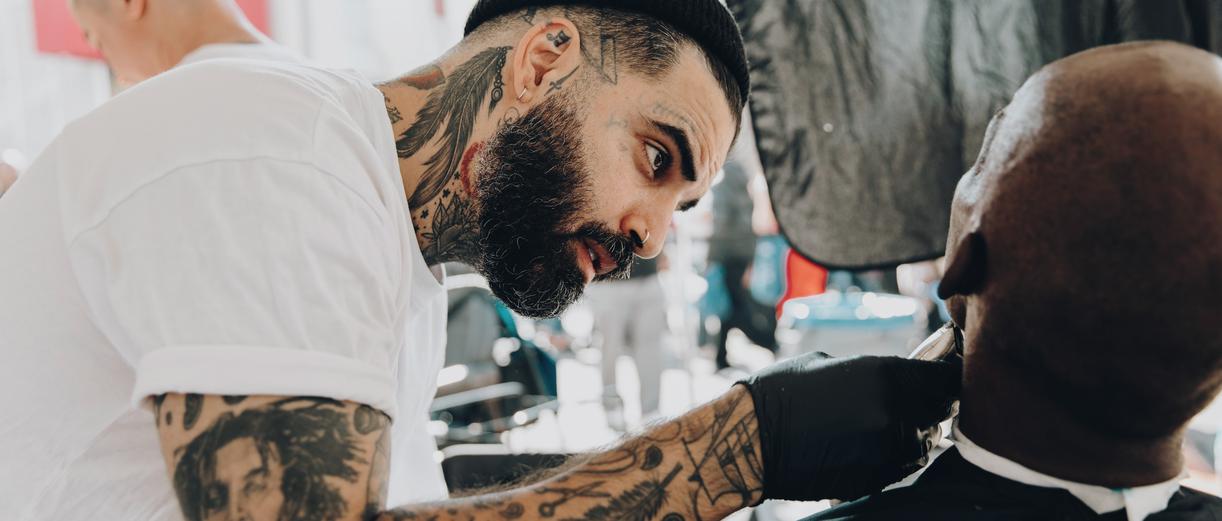
Every January, the Skid Row Carnival of Love helps nearly 5,000 unhoused people in and around downtown Los Angeles. Here's what it was like.
This story is part of the California.com series “Helping the Unhoused,” which examines homelessness and addresses ways we can help the unhoused and underhoused communities.
The Los Angeles sun beats down on the pavement as a light breeze blows through the air, carrying the flurries of bubbles and the bumpin’ tunes of Lauryn Hill’s “Doo-Wop (That Thing)” down the thoroughfare. A group of women dance along to the beat, smiling from ear to ear as they shimmy; children shriek in delight as a clown blows bubbles around them; an older gentleman clutches a giant teddy bear that he just won; and a teenager happily munches on kettle corn in between bites of cotton candy.
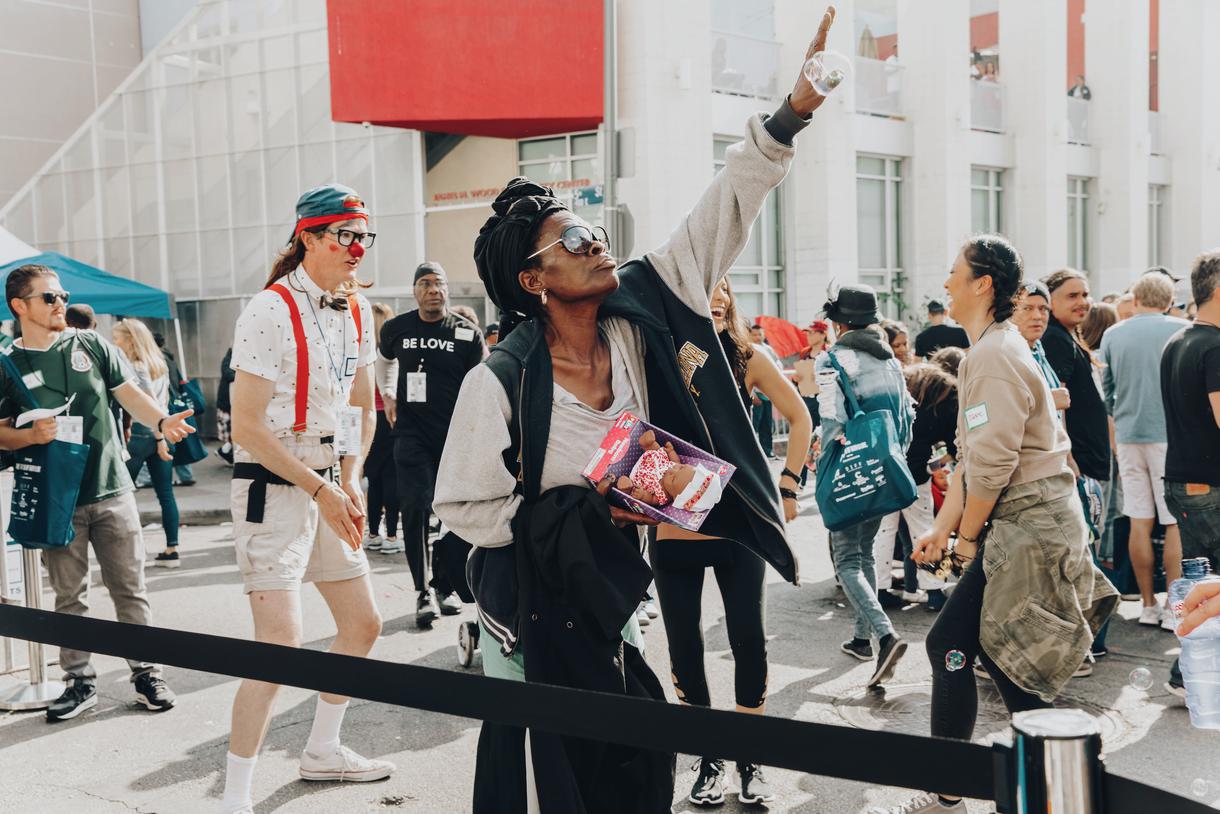

Does your business rank among the best in California?
nominate a businessLearn more about our selection criteria and vetting process.
For a moment, it’s easy to forget that I’m in the middle of Skid Row—a gritty and impoverished neighborhood in downtown L.A. dotted with dilapidated buildings and fragile tents that serve as homes for the city’s ever-growing unhoused and underhoused populations. It’s considered by many to be the epicenter of the Southern California homelessness crisis; there are nearly 60,000 homeless people currently living in Los Angeles County, according to the Los Angeles Times.
But during the Skid Row Carnival of Love, the scene here is much more vibrant—and hopeful. Founded by actor Justin Baldoni and his Wayfarer Foundation in 2014, this one-day event helps nearly 5,000 unhoused people in Skid Row every January by offering an array of services such as medical and dental care, foot washing, eye exams, haircuts, massages, legal services, and even dog grooming. There are also stations providing hot meals, sweet treats, clothing, shoes, showers, toiletries, children’s books, toys, and sleeping bags. Fun activities abound, too, between the numerous carnival games, arts and crafts zone, and kid’s area.
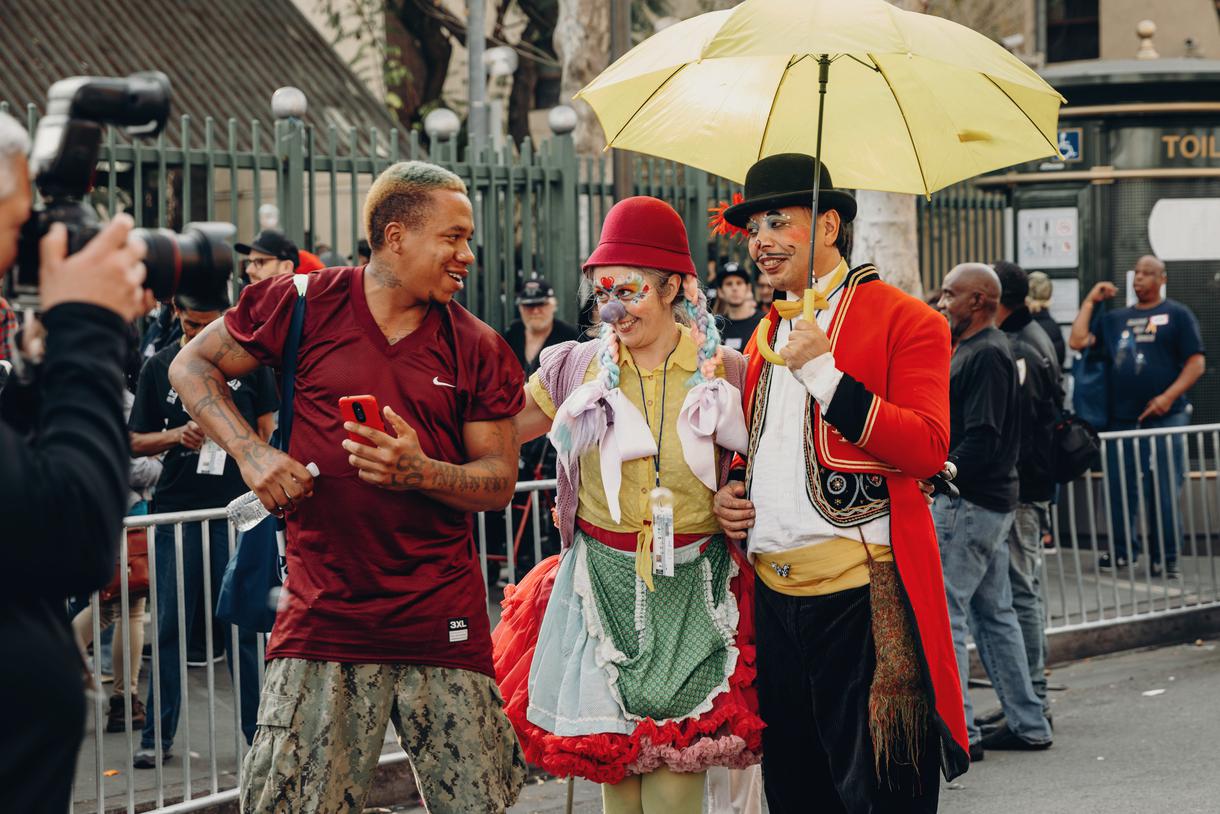
The entire carnival is powered by more than 2,000 volunteers who spend the day spreading love and kindness; this year, the California.com team and The Streets Barber Nasir Sobhani were among them, giving out 180 pairs of wool socks and free haircuts. But beyond the services, we also aimed to bring much-needed comfort to the unhoused community by simply listening to their stories and being empathetic to their situation. Because even though it is devastating and difficult to admit, the homeless often aren’t treated like human beings and dismissed as lazy ex-cons or drug addicts who sealed their own fates with bad decisions.
But the reality is much more complicated than that—and the stories are heartbreaking—and it became even more evident to me in just the six hours I spent with the Skid Row residents at the sixth annual Carnival of Love. Here’s a behind-the-scenes look at what it was like.
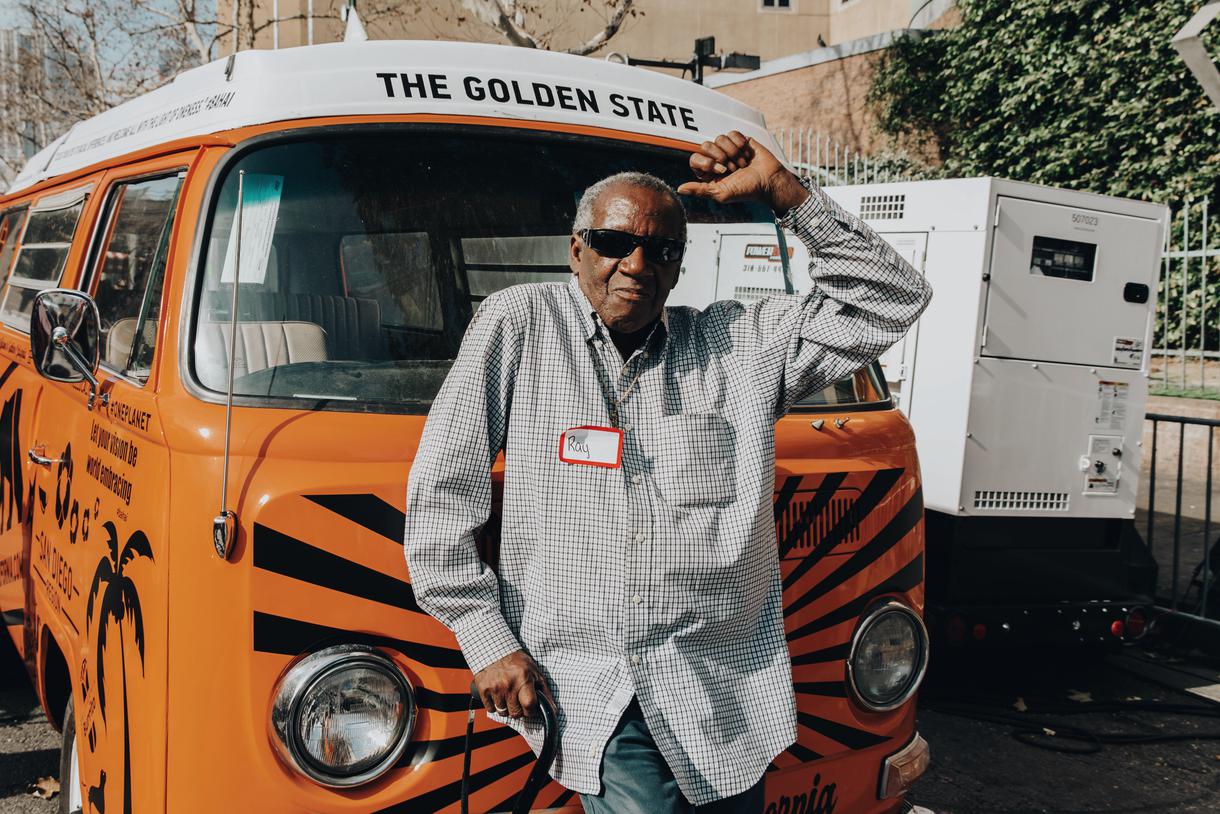
The Uber driver drops us off at the intersection of Sixth and San Julian Streets, where we have to check in to the Carnival of Love. Several other volunteers are already waiting, and after standing in line for several minutes, my arms start to burn from holding the heavy bag of haircutting supplies and several pairs of socks while trying not to spill my coffee. But as I take in the scene surrounding me, I realize I have nothing to complain about: A middle-aged woman in worn clothes limps through the streets alongside another woman in a wheelchair, makeshift tents line the dirty sidewalks, dumpsters overflow with trash, and a stray cat munches on spoiled food that’s fallen on the ground. It’s sad to think this is a world that thousands of people live in—just in this tiny pocket of the state.
We finally reach the check-in table and then proceed to our booth near the carnival entrance, walking past the other volunteers at the video-game truck, BBQ restaurant, ice-cream truck, kids activity center, and foot-washing station. We start assembling the salon chairs, setting up the haircutting supplies, and pairing the wool socks. Before I know it, an hour has gone by and the Carnival of Love organizers are calling everyone to gather near the main stage for the “volunteer blessing.”
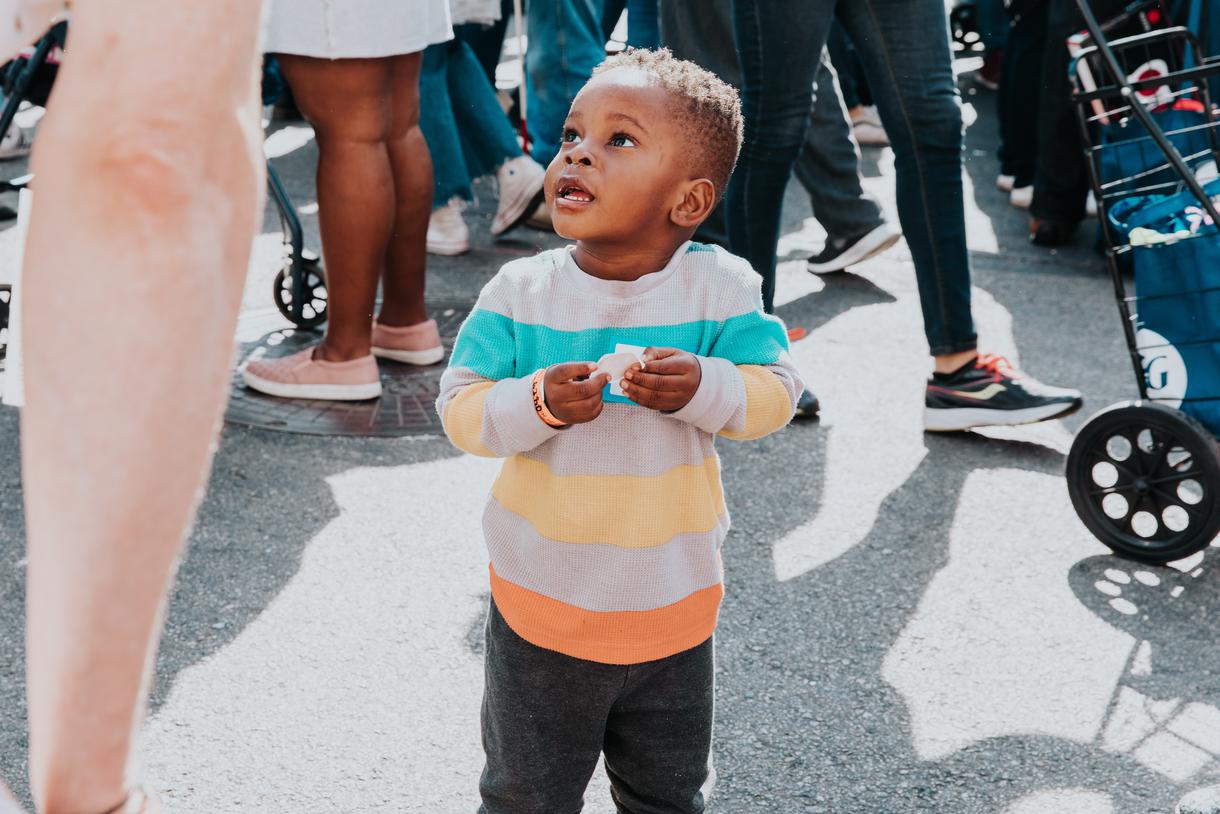
We head over to the stage and join the other Carnival of Love volunteers. Everyone is bursting with joy and chatting excitedly as Paul Asplund, the executive director of The Wayfarer Foundation, takes the stage. I feel even more inspired as he describes the origins of the festival and reminds us that it’s all about creating a human connection and spreading love and kindness. “We’re here to do service and connect with people,” he says. “Celebrate each other’s victories; mourn each other’s losses.”
He also encourages us to continue our service beyond today as he describes The Wayfarer Foundation’s efforts to expand its work. The organization is in the process of extending the Carnival of Love beyond a one-day affair; it aims to bring the signature event to additional cities across the United States and to put on smaller events in the L.A. region, thanks to the sheer number of volunteers around the country who express interest in helping out. “We have the power to make a difference together,” Asplund says.
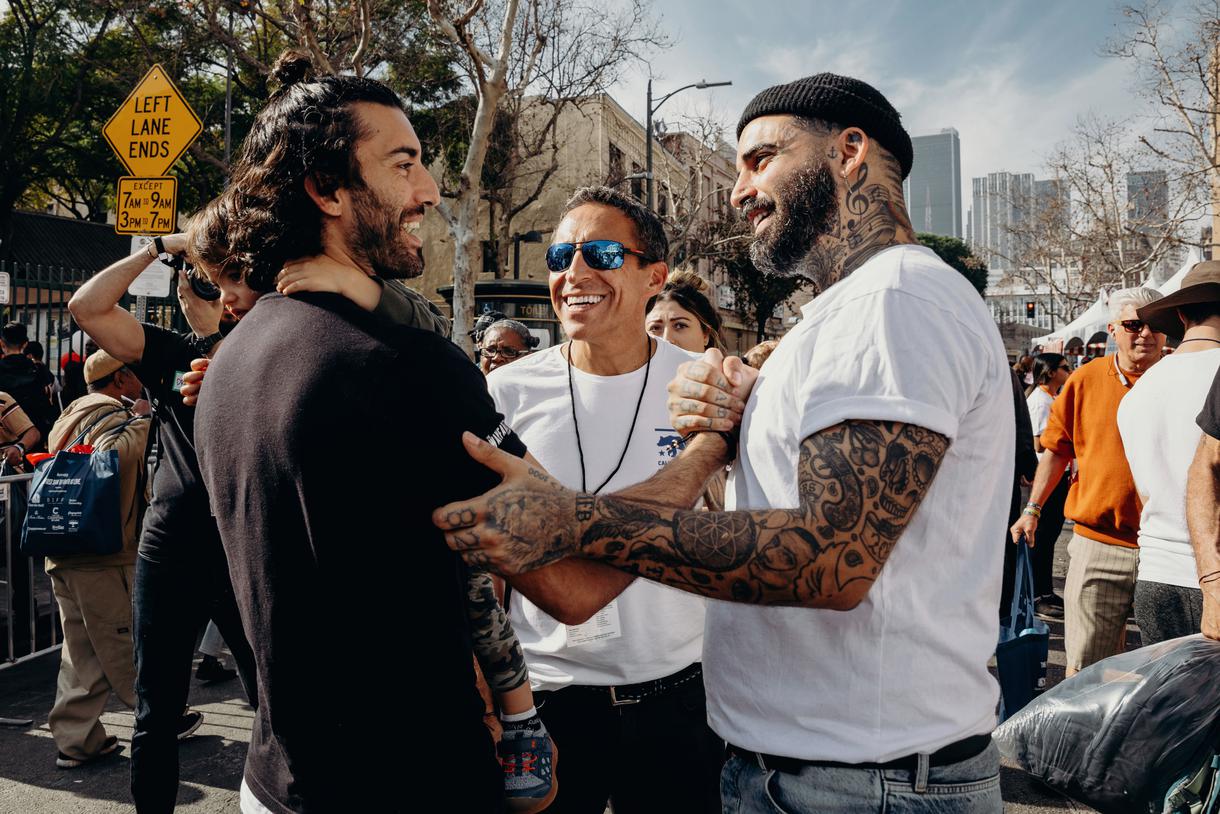
Once all the announcements are done, hip-hop violinist and former America’s Got Talent contestant Lindsey Stirling takes the stage and further energizes the crowd with a riveting performance. “See people as people,” she advises. “We all may be different, but we’re all the same in the way it’s important.”
But the dance party doesn’t end there. Before letting us loose, the organizers crank up Michael Jackson’s “Man in the Mirror” and tells us all to join hands and groove together while chanting, “We love you Skid Row.” It proves to be empowering and invigorating, leaving us ready and pumped up for the day ahead.
The doors officially open, and the crowds start pouring in. Many volunteers have been paired with homeless men and women who want to walk through the carnival with a buddy and ensure they receive all the services and supplies they need. It’s sweet to see them hugging each other, sharing stories, and dancing together—it’s obvious the unhoused are loving every minute, too. A lady with pink hair joins the clowns right beside our booth for a dance party as Beyoncé’s “Crazy in Love” comes on; a man named Jeff smiles as he approaches to grab a pair of socks from our booth, saying “Bless you, and have a great day, ma’m” before walking away; and a child beams from ear to ear as he’s handed a stick of cotton candy. The more I watch, the more I’m nearly moved to tears. The Carnival of Love attendees find happiness in the most seemingly simple things: a smile, a story, a hug, a bag of kettle corn. It becomes clear: They just want to be acknowledged and seen.
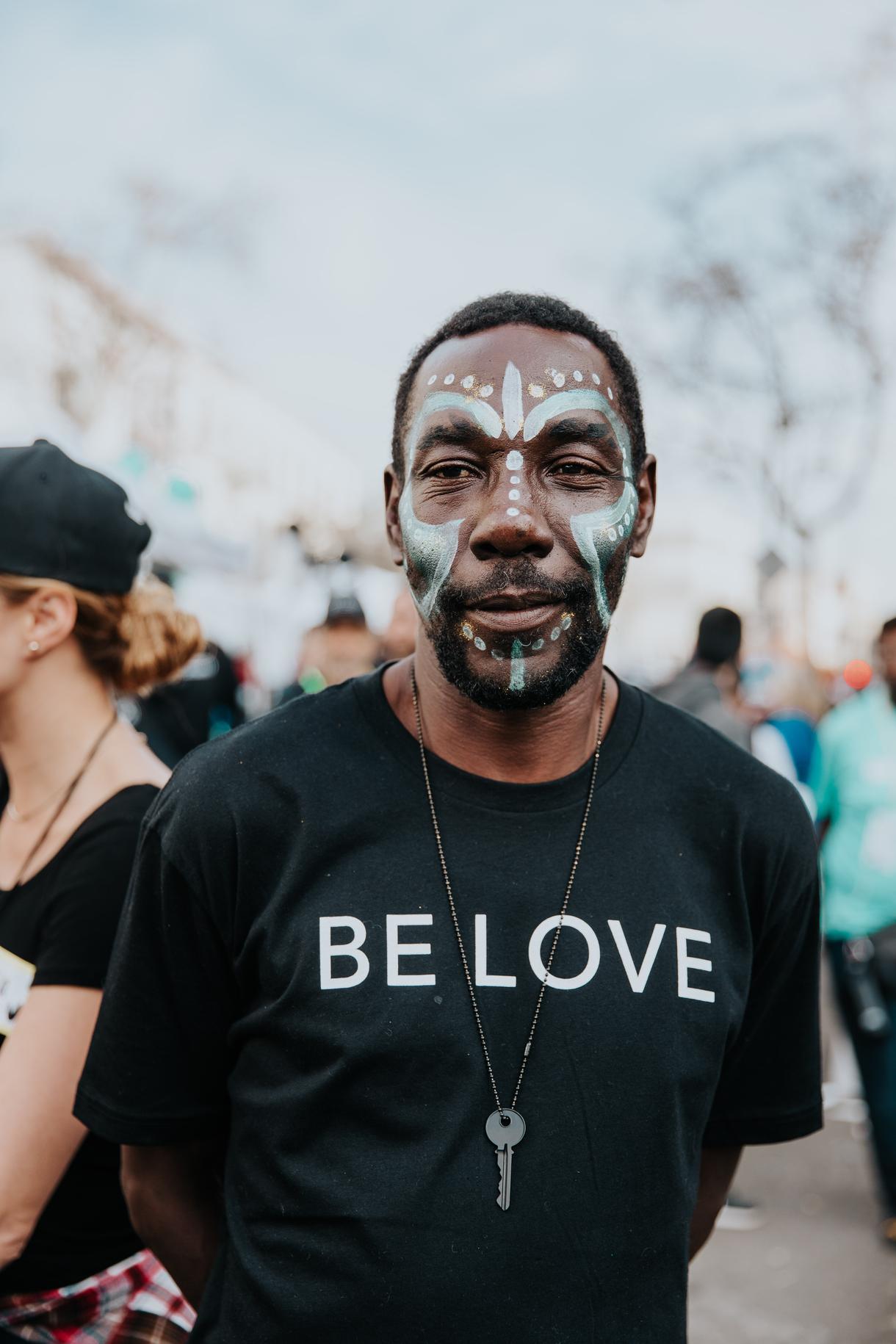
Sobhani is already giving his first haircut, and given how long the line is already, he knows he’ll be doing a lot of cuts today, but it’s what he loves to do. “This is my passion; this is what makes me happy,” he says. The Melbourne-based barber is the founder of The Streets Barber movement and the Clean Cut Clean Start Initiative, hitting the streets to offer free haircuts to the less fortunate and listening to their stories. He also visits juvenile halls and prisons to teach inmates the trade so they have hope for a different life after they get out. A former drug addict, he feels like he got a second chance in life and wants to give others the same opportunity.
It’s amazing to watch him as he connects with people and gets them to open up while cutting their hair; a young, good-looking man named Gio walks up looking defeated and barely wanting to talk at first, but within a matter of minutes, he’s smiling and chatting away with Sobhani. He tells Sobhani that he lost both of his parents when he was a teenager and has been fending for himself ever since, and even though he has a job, he can’t often afford to get services such as haircuts.
All 180 pairs of wool socks are gone, so I walk over to the haircutting line to help maintain the flow—the line snakes down the block. California.com is one of three organizations providing haircuts today. Stylists from Paul Mitchell and The Kind Cut are also volunteering their time to help the homeless look and feel good. I see Jeff sit down in front of a Paul Mitchell stylist for a cut. He’s smiling and taking big bites of his cotton candy; when he’s done, he starts throwing bits of popcorn into his mouth. He eventually closes his eyes and relaxes as the barber pampers him.
One of the most heartwarming stories comes from a middle-aged woman with a small dog. She says her life was transformed from the moment she discovered the pup in a trash can. Ever since that day, she stopped using drugs because she found purpose—and unconditional love. “We don’t have much food, but we have each other,” she says as she looks down at him and kisses the top of his head.
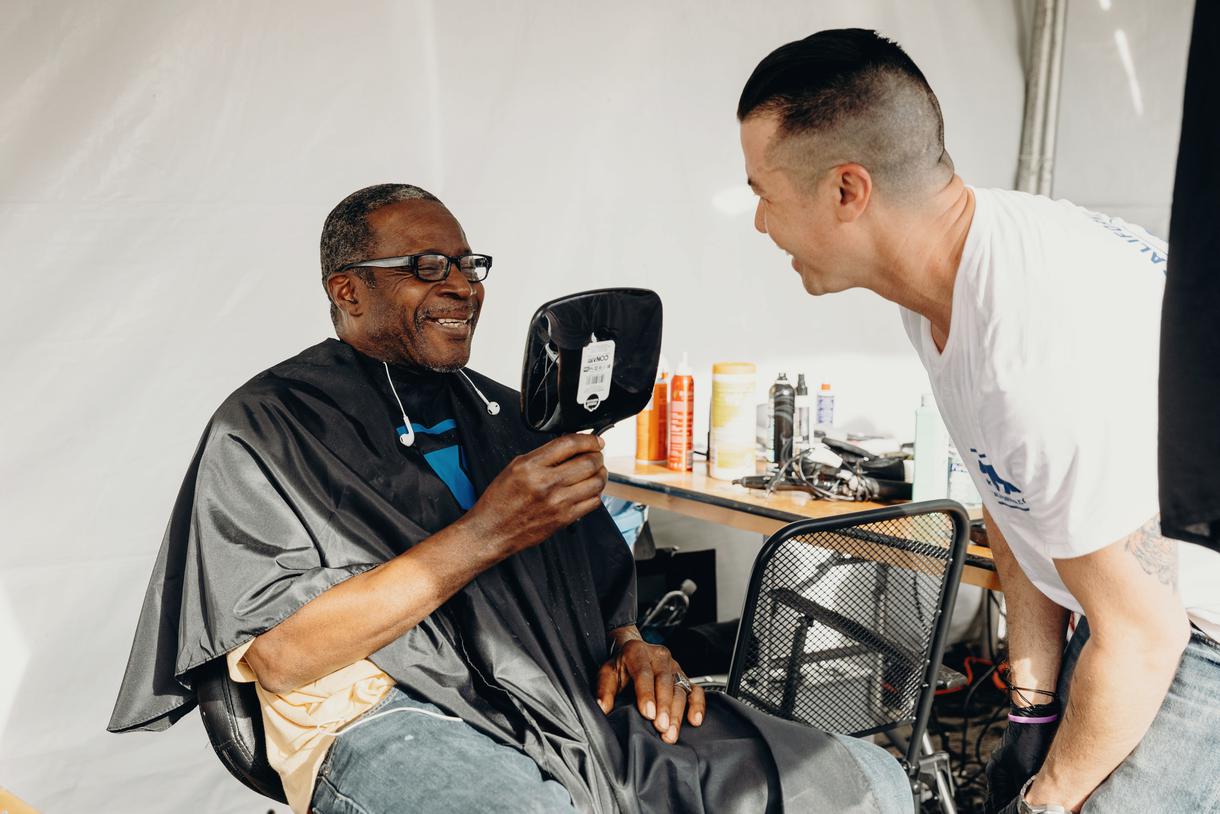
Another Skid Row resident named Leo also has a touching tale. A former addict who’s been clean for one year, he describes how his son wants him to return to his hometown of Mississippi so he can live near him and help him get back on his feet. While Leo longs to be reunited with his family, he is committed to staying sober for at least four more years. He’s been sober before and then started using again, so he wants to make sure he is truly reformed before inserting himself back into his family’s life. He doesn’t want to cause them any more pain.
I also chat with James, who’s willing to wait a long time for the one stylist who knows how to braid men’s hair. A recovering alcoholic, he now lives in a transitional housing building on Skid Row. He says he’s been sick for almost a month and hasn’t been outside much, and it’s priceless to see him smile as he closes his eyes and looks up to the sky. “The warm sun and cool breeze on my face makes me feel alive!” he exclaims.
I haven’t even been helping for two hours, but I’m already starting to feel overwhelmed by all of the stories I’ve heard so far. An older, very polite man named Tony tells me it’s his first time at the Carnival of Love. A retired U.S. Navy veteran, he fell on hard times after losing everything in Hurricane Katrina and had trouble getting back on his feet, despite having a business degree from the University of Notre Dame. He moved to Los Angeles two years ago in hopes of finding new opportunities and is still trying to pick up the pieces. He’s been able to find a job but still doesn’t have enough to afford a proper home.
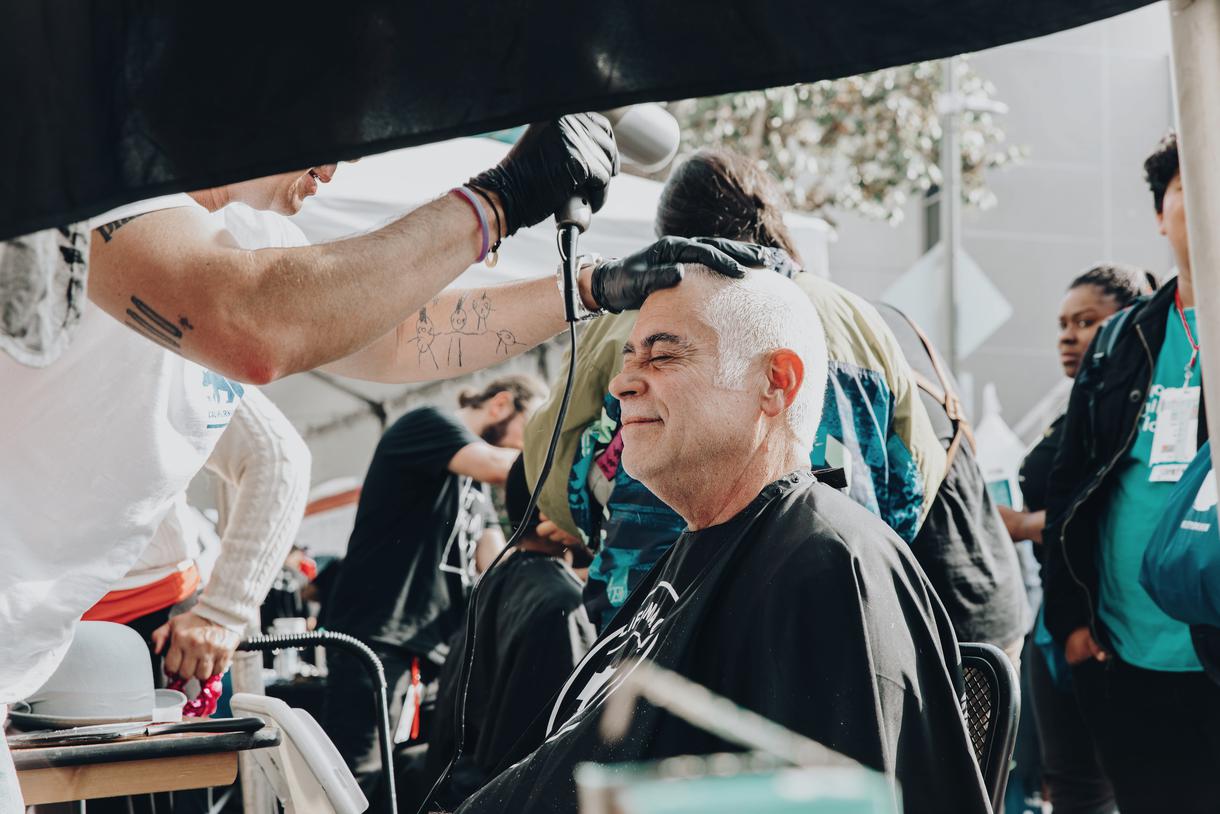
I watch as a woman looks at herself in the mirror, beaming at her new ’do. She turns 55 in March, and to commemorate the milestone birthday, she decided to get bangs—a style she hasn’t worn since her early 20s. She brushes her long locks away from her shoulders and hugs her Paul Mitchell stylist before walking away with a huge smile on her face.
Next in line is “Head,” a very tall, gregarious man who chats excitedly to me about his day. He’s having a wonderful time and already looking forward to next year’s carnival. He holds a bag full of clothes, new shoes, a couple of books, and a hygiene kit as he tells me his story. After having multiple surgeries on his knee and shoulder, he started taking drugs to manage the pain and eventually wound up on the streets. Now, he’s clean and working on getting himself back on his feet. Despite all the hardships he’s faced, he maintains a positive outlook: “You can do whatever you put your mind to,” he says. “Have faith and shine on—be a winner.”
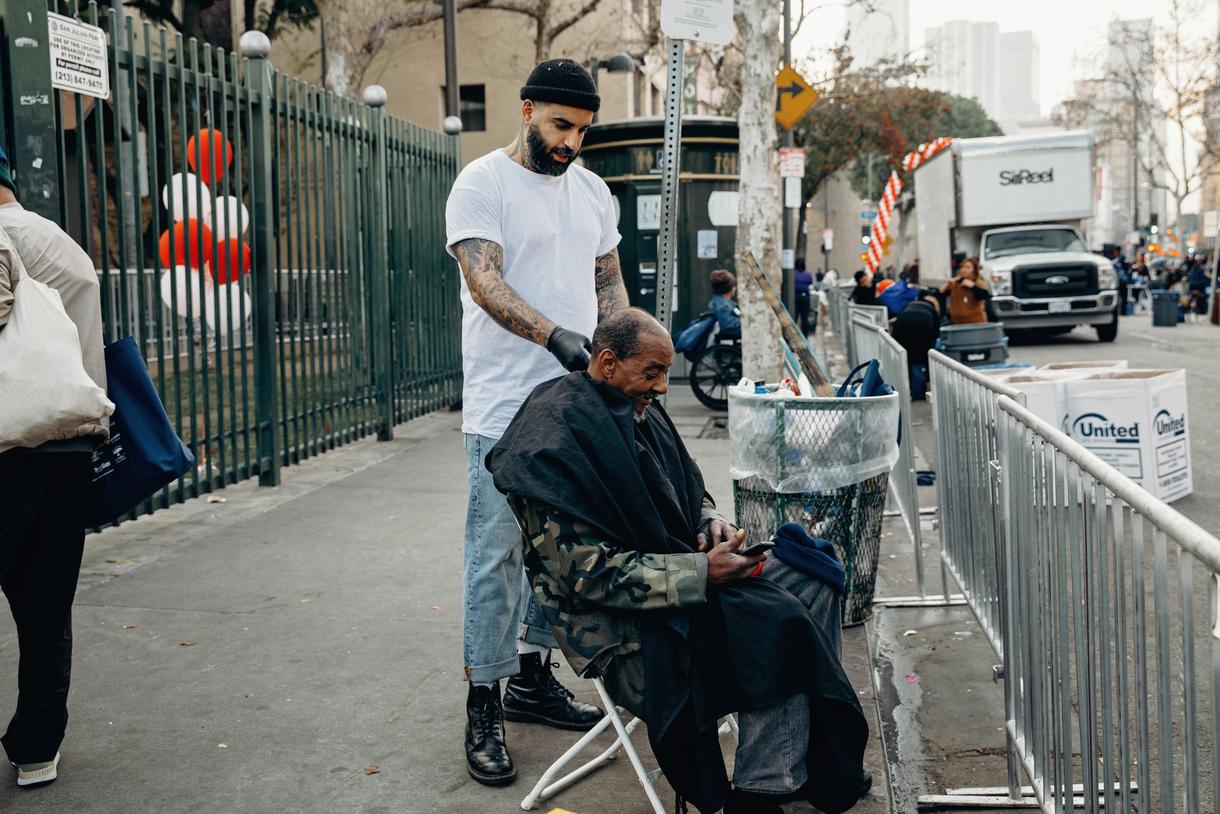
The Carnival of Love closes its doors, and the stylists sit the last few remaining people waiting in line for a haircut. Sobhani finishes cutting the hair of a man named Samuel, also known as the Skid Row barber. “Holla at the barber,” Samuel exclaims while chuckling. He comes over to chat with me and takes a seat on a white folding chair. The New Orleans native eats his blueberry muffin as he describes his love for music and dance and tells how he became the neighborhood’s original barber.
After becoming addicted to crack cocaine, he found himself in and out of prison, but he’s been able to keep himself afloat by providing haircuts. He learned the trade at the Los Angeles Mission and furthered his knowledge by watching YouTube videos, and now he regularly gives cuts to the residents of Skid Row. Though he says living on the streets can be tough, he enjoys the freedom of it.
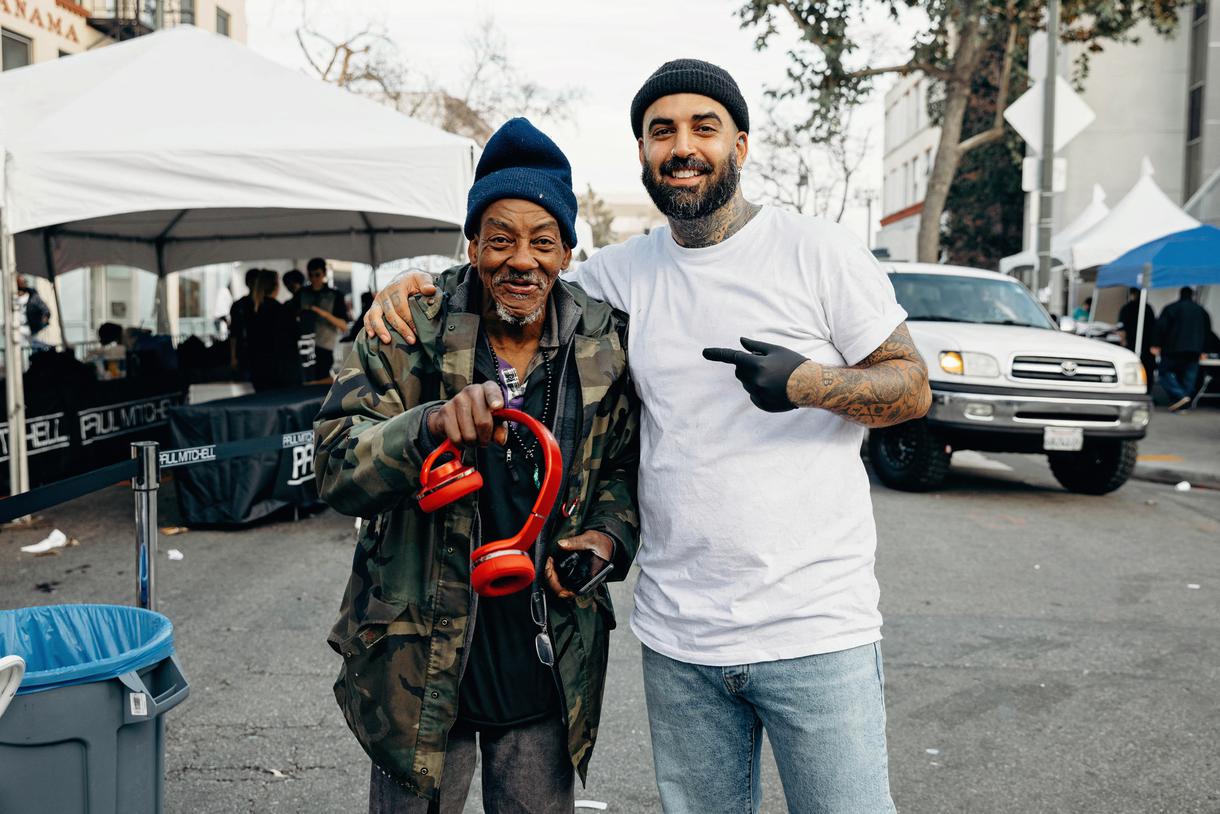
“[Skid Row] is my barber shop,” Samuel says. “I want to be my own boss and go to work when I feel like it. It’s a struggle, but I want to be able to put my hustle in every day and work for myself.”
So, he walks around with his tools in his backpack, providing haircuts and accepting donations from people who have something to spare. “I don’t care if I make $5,” he says. “I can buy myself a razor, a comb, a toothbrush, or a soda—and that’s good enough for me. I’m happy with that. ... I love what I do, and I love putting a smile on people’s faces.”
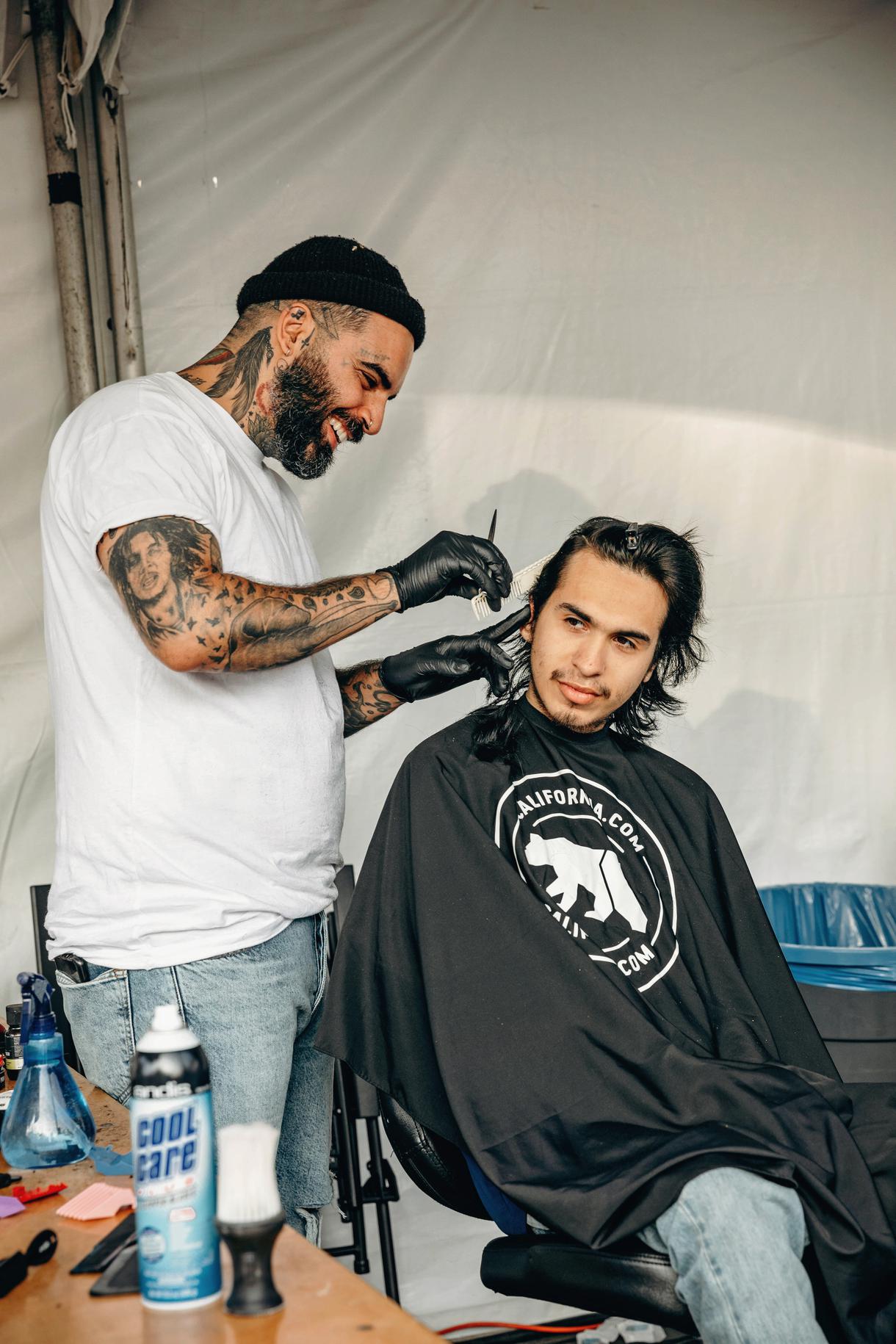
As Sobhani wraps up his final haircut of the day, I start to realize how exhausted I am—physically and mentally. Being on my feet all afternoon and listening to people’s stories has taken a toll; it’s hard to not become emotional. The stories I heard today were touching, gut wrenching, and inspiring; I wish I could take a magic wand and solve all of these people’s problems so they could have a better life. It’s also hard not to feel a twinge of guilt as I see the neighborhood starting to transform back into its usual appearance, with construction workers breaking down the booths and Skid Row residents giving in to their vices on the sidewalk.
But I try to take comfort in the fact that at least for one day, I helped many people feel better by simply showing them more love and kindness than they typically experience. The work was rewarding and eye opening, filling me with a sense of gratitude for the things we often take for granted. In the wise words of Samuel, the Skid Row barber: “You gotta be happy with what you got.”


Never been before? We’ll be your trustee Little Tokyo guide with a day’s worth of fun things to do in Little Tokyo.

People go on Memorial Day weekend getaways as an indirect celebration of life. How do you plan on celebrating the long weekend?
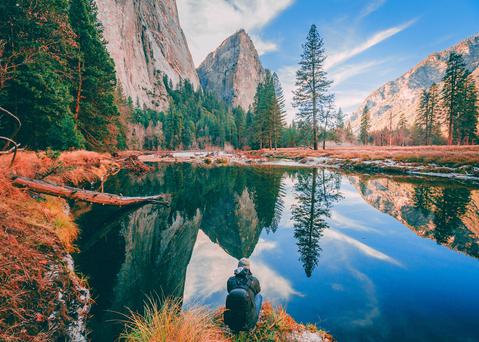
From undulating mountains, to coastal expanses, to verdant forests, here are some of the top spots for backpacking in California.
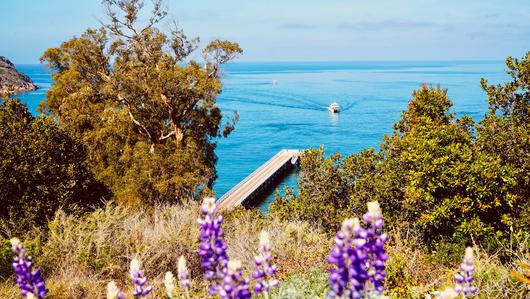
Settled off the California coast, the Channel Islands offer endless adventures. Here are the best things to do and how to get there.

